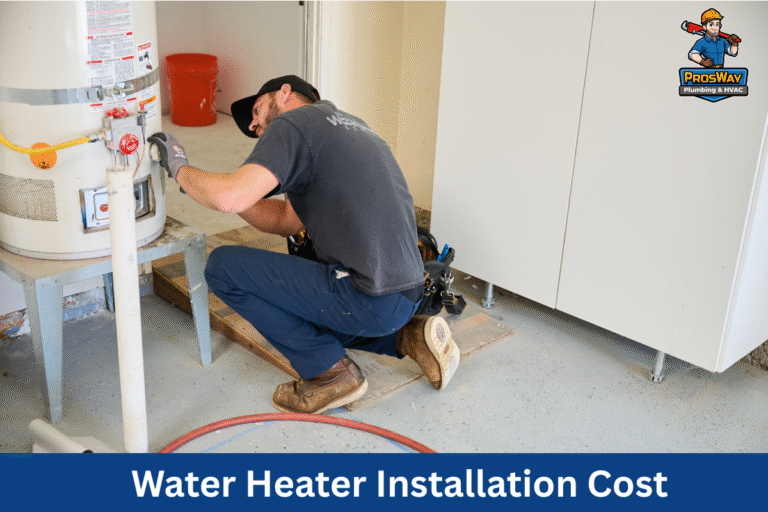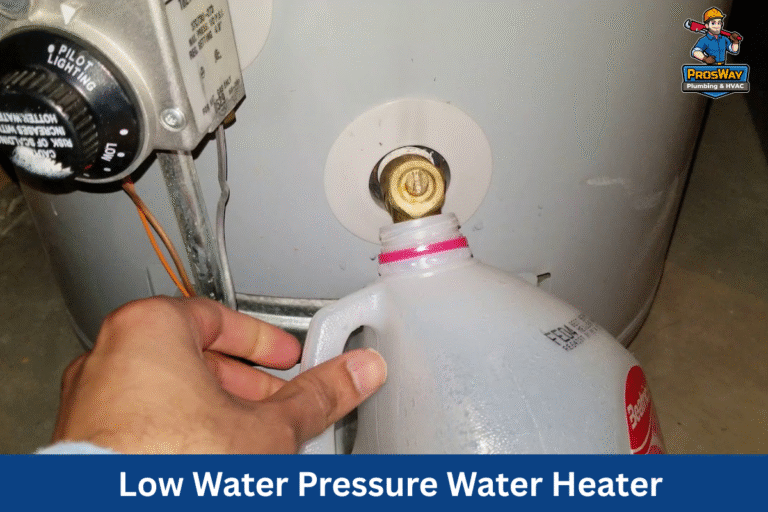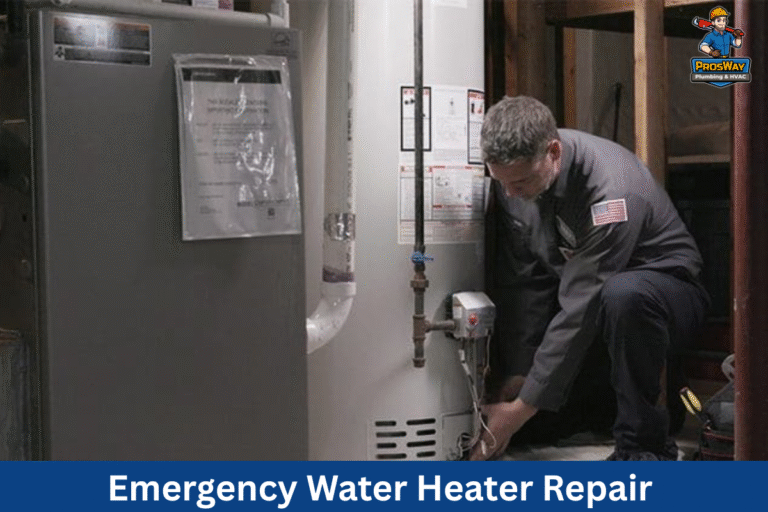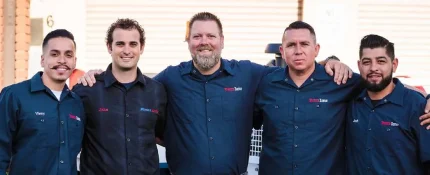Few things are more frustrating than turning on the tap and finding no hot water. It’s one of the most common complaints homeowners face with their water heater. The problem can strike both gas water heaters and electric water heaters, and while the cause may be minor, it can also point to a bigger issue that needs quick attention. This guide explains the main reasons behind a water heater no hot water, simple troubleshooting steps, and highlights when it’s time to call a licensed plumber.
Safety First (Do This Before Any Test)
Before touching anything, protect yourself and your home. Both gas and electric water heaters can pose risks when troubleshooting.
For electric water heaters:
- Switch the double-pole breaker in the electric panel to OFF.
- Remove access panels only when you’re sure power is completely off.
For gas water heaters:
- Turn the gas control valve knob to the OFF position.
- Check for a rotten egg odor (a sign of a gas leak).
- Ventilate the space by opening windows and doors. Never smoke or use appliances nearby.
General checks for both types:
- Inspect the temperature and pressure (T&P) relief valve and discharge pipe for leaks.
- Look and listen for warning signs such as hissing or gurgling.
- Call a licensed plumber or your utility company immediately if conditions seem unsafe.
First Step: Identify Your Water Heater Type
Troubleshooting depends on whether you have a gas or electric water heater, so confirm this first.
- Gas water heater signs: Look for a gas line, main gas valve, pilot light, ignition knob, or burner access panel.
- Electric water heater signs: Check for an electrical supply line, circuit breaker in the panel, reset button, and heating element access panels.
This distinction matters. Gas units often fail due to issues with the pilot light, thermocouple, or burner, while electric models usually struggle with a tripped breaker, faulty thermostat, or failed heating element.
A quick checklist helps:
- Is the pilot light on?
- Is the breaker tripped?
- Are thermostats set correctly (122–140°F range)?
- Has the reset button on the upper thermostat popped?
Knowing your water heater type ensures you take the right next steps instead of wasting time chasing the wrong problem.
Electric Water Heater – No Hot Water

Common Causes
An electric water heater not heating often points to issues in the electrical system or its heating components.
- Tripped circuit breaker: Electric water heaters draw a lot of current. Power surges or running multiple appliances at once can trip the breaker. When this happens, the heater shuts down completely until the breaker is reset.
- Faulty heating elements: Inside most tank water heaters are two elements, an upper and a lower. The upper one handles initial heating, while the lower maintains temperature. When one burns out, the tank can’t heat properly, leaving only lukewarm or cold water.
- Bad thermostat: Each element has a thermostat. If the upper thermostat fails, the lower element never activates, and you get no hot water. Incorrect settings (below 120°F) or a faulty high-temperature cutoff switch can also cause a shutdown.
- Loose wiring or electrical connections: Over time, wires inside the access panel can loosen, corrode, or burn. This interrupts the circuit to the heating elements, cutting off the heater’s ability to warm water.
How to Fix? Step-by-Step
Troubleshooting an electric water heater with no hot water involves checking the power first, then moving step by step through the heating system.
- Check the power supply: Open the electrical panel and confirm the double-pole breaker is in the ON position. Reset it if tripped. A frequently tripping breaker often signals a deeper problem with the elements or wiring.
- Inspect the reset button: Behind the upper access panel is a red reset button on the thermostat. Push it firmly to restore operation. A tripped reset indicates overheating, often caused by sediment, a faulty thermostat, or an element short.
- Test heating elements with a multimeter: Remove power, disconnect the wires, and place the multimeter on the element’s terminals. A working element shows continuity. A failed one reads open circuit and must be replaced.
- Check thermostats: Use the multimeter to test for continuity while turning the temperature dial. Replace thermostats that fail to close the circuit.
- Inspect wiring connections: Look for charred wires, corrosion, or loose screws at terminals. Tighten connections carefully with a screwdriver or replace damaged wiring.
Replacing heating elements or thermostats requires draining the tank partially, removing the old part with a wrench, and installing the new one with plumber’s tape for a proper seal.
Always restore water to the tank before switching the breaker back on to avoid burning out the new element.
Gas Water Heater – No Hot Water
Common Causes
When a gas water heater stops producing hot water, the problem usually involves the ignition system, gas supply, or burner assembly.
- Pilot light blown out: The pilot flame keeps the burner ready to ignite. Drafts, dirty pilot orifices, or thermocouple issues can cause the flame to go out.
- Faulty thermocouple: This sensor detects the pilot flame. If it fails, it shuts off the gas to the burner for safety, leaving you with no hot water.
- Gas supply issues: A closed or partially closed main gas valve, a kinked flexible gas line, or an issue with the utility’s gas supply interrupts fuel delivery.
- Burner problems: Dirt, dust, or rust in the burner assembly prevents proper ignition. In some cases, a bad gas valve regulator also restricts gas flow to the burner.
How to Fix? Step-by-Step
Troubleshooting a gas hot water heater with no hot water requires working step by step, with safety first.
- Verify gas supply: Check the main gas valve and inlet valve. Ensure they’re fully open. Test another gas appliance, like a stove, to confirm gas is flowing into the house. Call the utility company if no appliance works.
- Inspect and relight the pilot light: Open the access panel at the bottom of the tank. If the pilot is out, set the gas control valve to OFF and wait at least five minutes for any gas to clear. Turn it to PILOT, press the ignition knob, and use the built-in ignitor or a long lighter to relight. Hold the knob down for 60 seconds, then turn it to ON.
- Check the thermocouple: The thermocouple may be dirty or faulty if the pilot light won’t stay lit. Lightly clean soot from the tip with sandpaper. If still defective, replacement is required.
- Examine the burner assembly: Remove dust, rust, or debris from the burner and orifices with compressed air or a brush. Poor combustion causes weak or no heating.
- Inspect the gas valve and regulator: A faulty control gas valve can fail to send fuel to the burner. Replacement should be done only by a licensed plumber or technician, as gas leaks are a serious hazard.
A gas water heater can often be restored with a safe pilot relight or by cleaning the burner, but problems involving the thermocouple or gas valve usually call for professional repair.
Other Possible Reasons You Have No Hot Water
Not every case of Water Heater No Hot Water comes down to breakers, heating elements, or pilot lights. Sometimes the issue is hidden inside the tank or tied to household demand.
Sediment Buildup in the Tank
Over time, minerals and sediment settle at the bottom of the water heater tank. This insulates the heating element in an electric unit or the burner flame in a gas model, slowing heating and sometimes blocking it entirely. Limescale can also coat the heating surfaces, reducing efficiency.
Tank Size Too Small for Demand
A water heater that worked fine years ago may no longer meet current household needs. More occupants, extra bathrooms, or higher usage mean the tank runs out faster.
Gas heaters recover quicker than electric, but undersized tanks inevitably leave cold showers.
Broken Dip Tube
The dip tube directs incoming cold water to the bottom of the tank. A cracked or broken tube lets cold water mix at the top, reaching faucets before it heats. This is a common but often overlooked reason for sudden loss of hot water.
Leaks in Hot Water Lines
Water escaping from a leak in the hot water piping reduces flow and temperature at fixtures. Check for damp spots, puddles, or unusually high water bills. A plumber can pressure-test the system to confirm hidden leaks.
Water Heater Age
Most water heaters last about 8–12 years. Beyond that, corrosion, worn components, and declining performance make frequent breakdowns likely.
An aging heater that constantly fails to produce hot water is often best replaced rather than repaired.
Seasonal and Temperature Factors
During winter, colder incoming water lowers efficiency and increases recovery time. Raising the thermostat setting slightly to 120–125°F helps balance comfort and safety. Insulating the tank and pipes also reduces heat loss.
Anode Rod and Corrosion
A depleted anode rod allows corrosion inside the tank, leading to rust, poor heating performance, and eventual leaks. Checking and replacing the rod every 2–3 years helps extend tank life and maintain reliable hot water.
Preventive Maintenance Tips

- Annual service: Hire a licensed plumber once a year to flush the tank, test the T&P valve, and inspect the anode rod and controls.
- Flush tank: Drain annually to remove sediment and limescale; add a softener or scale filter in hard water areas.
- Test T&P valve: Lift and release once a year; water should flow and stop cleanly when released.
- Inspect anode rod: Check every 2–3 years; replace when corroded to prevent tank rust.
- Label controls: Clearly mark breaker switch, shut-off valves, and thermostat for quick access.
- Professional inspection: Annual check catches loose wiring, faulty thermostats, and gas or venting issues.
When DIY Isn’t Enough: Call a Professional
Some water heater problems are too complex or too risky for homeowners to handle alone. Gas leaks, electrical hazards, or a tank that continues to fail after basic checks all require professional attention.
Working with gas valves, live circuits, or corroded tanks without proper training puts your safety at risk.
Licensed plumbers bring the right tools and expertise to diagnose issues quickly. They can test thermostats, replace heating elements, relight pilot systems safely, or recommend replacement when the heater is beyond repair.
Also, professional service guarantees that the work is compliant with plumbing codes, keeping your warranty valid.
For Northern New Jersey homeowners, ProsWay Plumbing & HVAC provides expert repair, maintenance, and replacement for both electric and gas water heaters.
Our technicians know how to troubleshoot everything from sediment buildup and faulty thermostats to gas supply problems and venting issues, getting your hot water restored safely and quickly.
Final Thoughts
When you face Water Heater No Hot Water, the solution starts with knowing your system type. Electric water heaters often fail due to tripped breakers, bad thermostats, or faulty heating elements. Gas models commonly struggle with pilot lights, thermocouples, or burner issues. Other factors like sediment buildup, tank age, or undersized capacity also play a role. Regular maintenance, flushing, checking the anode rod, and testing the T&P valve keep your unit reliable.
Get Your Hot Water Back Today!
Cold showers shouldn’t be the norm. ProsWay Plumbing & HVAC provides professional repair, maintenance, and replacement for both electric and gas water heaters in Northern New Jersey. Call us now at (862) 260-5870 or Book Online now and get your hot water back, safely and reliably.








